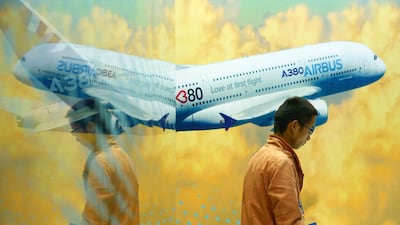Airbus has dismissed doubts over demand for the world’s largest passenger plane, the double-decker A380, even after it lowered production targets in July.
“Every 15 years, the industry is doubling in size,”said the chief operating officer for customers, John Leahy.
“So here you have London Heathrow, totally congested. JFK, congested. Los Angeles, congested. Hong Kong, congested. How are we going to double the traffic flows in the next 15 years if we don’t use larger aircraft like the A380?”
Despite that longer-term optimism, Airbus now is lacking in new orders for the A380. In 2018, the company plans to cut the A380’s delivery target to 12 a year from 27 in 2015 and about half what is projected for this year, to prevent a glut of unsold planes. Singapore Airlines Ltd said this month it will not extend a lease on one of aircraft.
The France-based aircraft maker is also confident in plans from engine maker Pratt & Whitney to solve production delays for its next-generation single-aisle planes, the A320neo, Mr Leahy said.
“It is disappointing the situation we find ourselves in. But it’s a good engine for everything we can see. They have some production difficulties that they’re working their way through,” Leahy told reporters in New York after a gathering of aviation executives and analysts known as the Wings Club.
United Technologies Corp said earlier this month it would deliver 150 of its Pratt & Whitney engines this year, missing its target of 200 and pressuring cash flow.
Mr Leahy’s upbeat comments came as the US government and Boeing claimed victory in a dispute with the EU, claiming the Euopean manufacturer gained huge advantages from subsidies.
The European Union failed to eliminate subsidies to Airbus that were previously found to violate trade rules, the World Trade Organisation said in a ruling that opens the door to billions of dollars in sanctions against Brussels.
The finding by a WTO compliance panel strikes a blow to the EU in a long-running dispute with the United States over government subsidies to the world’s two largest aircraft manufacturers, Airbus and Boeing The US had said it would seek US$10 billion in sanctions if the EU did not remedy illegal financing, which the trade body found in a 2011 ruling had cost Boeing plane sales and market share.
The Geneva-based WTO cannot force nations or companies to drop payments that violate trade rules, but it can authorise retaliatory measures to pressure governments into complying with its rulings. The EU can still appeal the latest decision. If it loses, the US can seek sanctions. Separate cases involving assistance for Boeing remain under consideration.
“This report is a sweeping victory for the United States and its aerospace workers,” U.S. Trade Representative Michael Froman said in a statement. “We have long maintained that EU aircraft subsidies have cost American companies tens of billions of dollars in lost revenue, which this report clearly proves.”
The WTO panel said EU member states have failed to adequately remedy $18bn in launch aid for Airbus’ A380 superjumbo and other jets, infrastructure support and equity investments that the trade body determined in 2011 had unfairly benefited the plane maker. The ruling also cited additional subsidies not mentioned in that decision five years ago: more than $4bn in launch aid for Airbus’ new A350 wide-body jet.
In a separate case, the trade organisation is still determining whether Boeing and the US have adequately addressed $5.3bn in illegal aid that flowed to the Chicago-based planemaker. The EU has filed another case challenging $8.7bn in subsidies granted by the state of Washington in 2013 in exchange for a Boeing pledge to manufacture its 777X jet in the Puget Sound region.
business@thenational.ae
Follow us on Twitter @TheNationalPF

